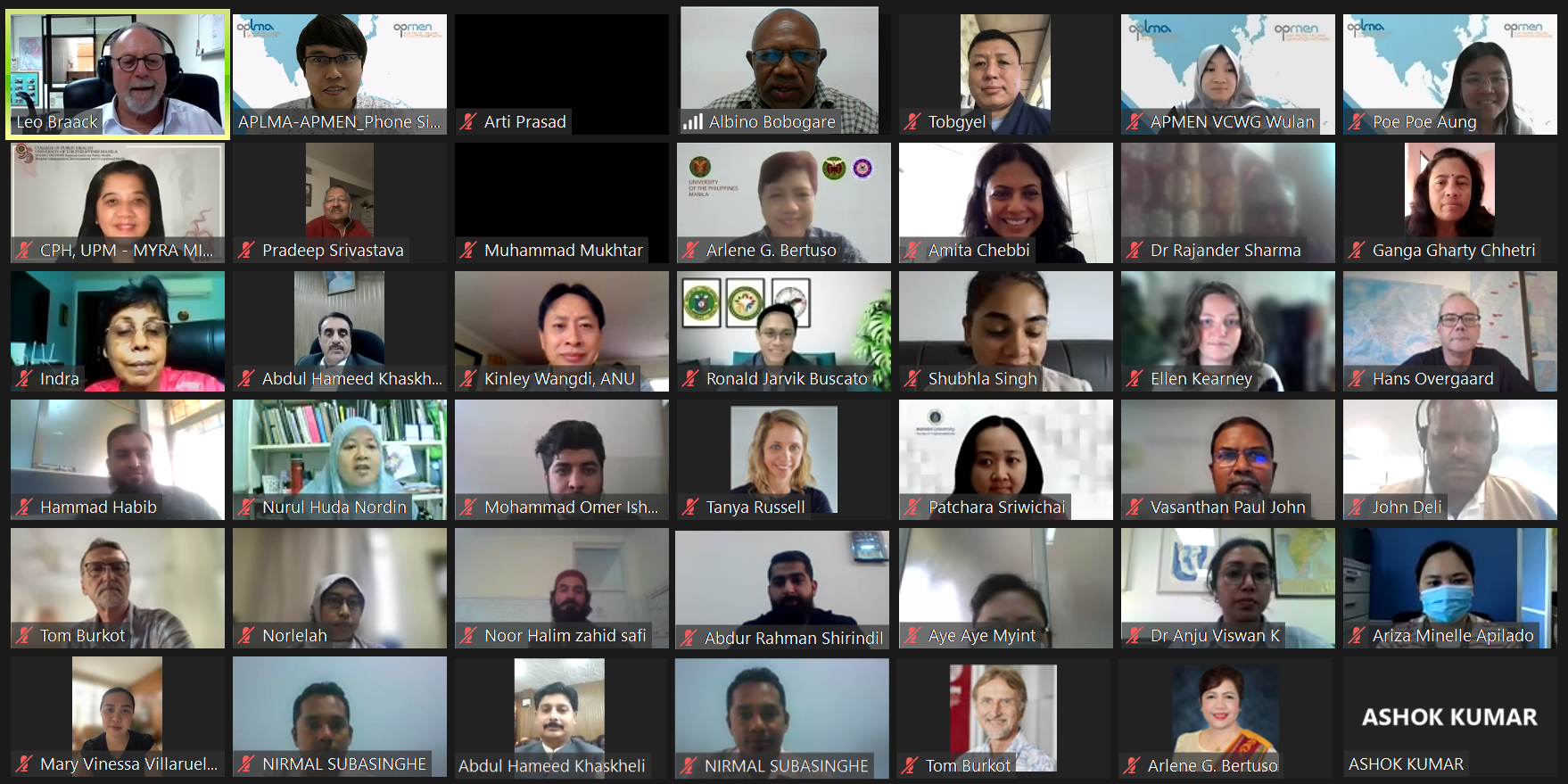
Vector control experts and colleagues across the world joined the virtual APMEN Vector Control Working Group (VCWG) Annual Conference 2022, which took place during the afternoons of 15, 17 and 22 November 2022. This Annual Meeting was intended to provide international State-of-the-Art knowledge updates to National Malaria Programs (NMP) around vector control issues, and identify potential areas of technical support to APMEN partners. One hundred seventy-five individuals from National Malaria Programs and Partner Institutions participated, shared, and discussed not only the training opportunities in vector surveillance and the update on outdoor transmission reduction but also through the many learning primer talks from Asia Pacific countries.
Day 1 was opened with a plenary welcome by APLMA Executive Vice President, Amita Chebbi, and a welcoming address from Albino Bobogare, the Director of Solomon Islands' National Vector Borne Disease Control Program.
“We congratulate each other on the progress we have achieved in reducing malaria in our region and we are particularly proud of the achievements of our friends in the Greater Mekong Subregion who are so close to achieving malaria elimination following in the footsteps of Sri Lanka and China” - Albino Bobogare, Director of National Vector Borne Disease Control Programme, Ministry of Health and Medical Services, Solomon Islands
An update on outputs and achievements of the APMEN VCWG during 2021-2022 was presented by Dr Leo Braack, Co-Chair of APMEN VCWG. This day one was devoted to issues relating to vector surveillance and control capacity shortfalls and then looked at different courses that are available for capacity strengthening of NMP staff, which included the Global Vector Hub, a global open-access community for vector control information and research shared by Robert Jones from Arctech Innovation/ LSHTM, The Resistant Mosquito: The Fight against Malaria online course by Konstantina Boutsika from SwissTPH, WHOCC virtual training for entomology presented by Dr Patchara Sriwichai from Mahidol University, an overview of Pacific Mosquito Surveillance Strengthening for Impact (PacMOSSI) online training by Dr Tanya Russell from James Cook University, and country vector surveillance needs assessment by Prof Tom Burkot from Mosquito-Borne Diseases Group/ AITHM. These presentations were followed by a breakout group session to discuss additional training gaps and needs that APMEN should be looking at filling by way of different interventions and courses.
Dr Chantana Padungtod, Director of the Thailand Division of Vector-borne Diseases, welcomed the day 2 conference.
“The Greater Mekong Subregion is very likely soon to have reached the goal of zero local transmission, but the mosquito-borne challenges will not be over and we all continue to be challenged by diseases such as Dengue, Chikungunya and others, so I'd like to propose that APMEN should broaden its scope of focus to embrace these other vector-borne diseases” - Dr Chantana Padungtod, Director of Division of Vector Borne Diseases, Ministry of Public Health, Kingdom of Thailand
Day 2 was dedicated to outdoor biting challenges and vector control tools available to reduce outdoor malaria transmission. Five excellent presentations set the scene, most of them state-of-the-art tools for outdoor control of malaria vectors, such as the use of Attractive Targeted Sugar Baits (ATSB's) by Amir Galili from Westham Co, the impact of spatial repellents in Indonesia by Prof Din Syafruddin from Eijkman Institute, targeted outdoor residual spraying in Thai-Myanmar border by Victor Chaumeau from SMRU, the use of Ivermectin endectocides for mosquito control by Dr Kevin Kobylinski from MORU, and an overview of the malaria status and vector bone diseases control challenges in Thailand by Mr Pongsakorn Sadakorn from DVBD, followed by a breakout discussion on research needs for outdoor biting.
On day 3, a wonderful range of presentations on important issues or technologies was started with a presentation from Dr Leo Sora Makita, Programme Manager of Malaria Vector Borne Diseases, who gave an overview on the malaria situation and vector control activities in Papua New Guinea, followed by Dr Muhammad Mukhtar, Director from Directorate of Malaria Control Pakistan, who provided an insightful presentation on vector control during and after the recent flood disaster in Pakistan, Ellen Kearney from Burnet Institute outlined studies on Anopheles salivary antigens as serological biomarkers of vector exposure and malaria transmission, and then Dave de la Cuesta from Development Finance International shared information on the role and contribution of private sector in vector-borne disease control and capacity building. Finally, Dr Risintha Premaratne, Malaria Advisor from WHO SEARO spoke on Sri Lanka's malaria elimination and prevention of re-establishment. The audience members of the working group were actively engaged during Question-and-Answer session before closing the conference.
These three days of discussions yielded very interesting ideas and conversations around what and how we can strengthen vector surveillance and control. This conference highlighted greater integration of vector surveillance and control systems across the national programs and the opportunities to enhance capacities on vector control and surveillance and intervene in innovative approaches to combat the existing and new challenges such as outdoor malaria transmission to reach our ultimate goal of malaria elimination by 2030.
“From earlier in the year when the vector control working group banded together in response to a request of support from Pakistan and in fact, I have never seen a more rapid turnaround of support from across the world literally overnight - a dedicated bunch of individuals and institutions came together to support Pakistan with some very targeted assistance in the area of vector control” – Amita Chebbi, Executive Vice President, Advocacy and Programs, APLMA-APMEN
Thank you, all the speakers from National Malaria Programs and Partner Institutions, and APMEN VCWG team, as well as each attendee for the active participation and discussion throughout these three days.
